| 1 |
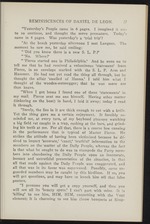 |
“...these statements in
my mail. Pierce sent me one himself. Having other matter
(tinkering on the boat) in hand, I laid it'away; today I read
it through.
Surely, the lies in it are thick enough to cut with a knife.
Yet the thing gave me a certain enjoyment. It forcibly re-
minded me, at every turn, of my boyhood pleasure watching
a big field rat caught in a trap, rushing at the bars, and grind-
ing his teeth at me. For all that, there is a coarse low cunning
in the performance that is typical of Master Pierce. He
strikes the attitude of having been victimized because he de-
sired to impart accurate, exact, truthful information to the
members on the'matter of the Daily People, whereas the fact
is that what he sought to do was to stampede the Party mem-
bers into abandoning the Daily People upon an inaccurate,
inexact and untruthful presentation of the situation, in that
all that made against the Daily People was exaggerated, and
all that was in its favor was suppressed. Possibly, some un-
guarded...”
|
|
| 2 |
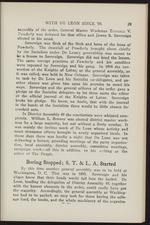 |
“...WITH DE LEON SINCE '89, 29!
assembly of the order, General Master Workman Terrence V.
Towderly was defeated for that office and James R. Sovereign
elected in his stead.
Sovereign was flesh of the flesh and bone of the bone of
Powderly. The downfall of Powderly brought about chiefly
by the Socialists under De Leons generalship was meant to
ke a lesson to Sovereign. Sovereign did not heed the lesson.
The same corrupt practices of Powderly and his satellites
were repeated by Sovereign and his gang. In 1894 the con-
vention of the Knights of Labor, or the general assembly, as
it was called, was held in New Orleans. Sovereign was taken
to task by De Leon and his Socialist co-delegates, and an-
other chance was given him upon his promise to mend his
ways. Sovereign and the general officers of the order gave a
pledge to the Socialist delegates to let them name the editor
of the official journal of the Knights of Labor. Sovereign
broke his pledge. He knew, no doubt, that with the journal
in the...”
|
|
| 3 |
 |
“...organization that had a
world of enemies to fight against; these soon left the party
pe Leon worked with greater zeal than ever. His editorials
in the Daily People were like cannon shots aimed at the armor
of capitalism. With De Leons none of the writings in the best
of the Social Democratic sheets could be compared.
There still remain to be told many happenings of the days
of the so-called split and the campaign of 1900, a year there-
** deeply wounded the young movement
which had been guided by the master-hand of Daniel De Leon
to make straight for the proletarian revolution. Well may
^e deeds that inflicted the wounds upon the Socialist Labor
Party be called the Crime of 1899. What slander failed to ac-
complish the false prophets of reform sought to bring about
With promises of immediate relief for the workers.
Fifteen years have passed since this Crime of 1899, and...”
|
|
| 4 |
 |
“...of this memorable meetingmemorable
because the first where Debs and De Leon addressed an audi-
ence together, and because both Debs and De Leon were at
their best. Sherman was sandwiched in between the two and
cut a sorry figure. t
It was a grand meeting. The audience consisted of men
and women from both the Socialist Labor Party and the So-
cialist Party, members and sympathizers. Debs
better than the one stenographically reported which he ha
delivered the day before. De Leons speech was a master-
piece The audience applauded both speakers loudly and long.
In introducing the speakers I was not prepared to deliver...”
|
|
| 5 |
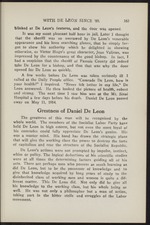 |
“...inquired. Never felt better in my life, De
Leon answered. He then looked the picture of health, robust
and strong. The next time I saw him was a* the Mt. Sinai
Hospital a few days before his death. Daniel De Leon passed
away on May 11, 1914.
Greatness of Daniel De Leon
The greatness of this man will be recognized by the
whole world. The members of the So'cialist Labor Party have
held De Leon in high esteem, but not even the most loyal of
his comrades could fully appreciate De Leons genius. His
was a master mind. His hand has drawn the strategic plans
that will give the working class the power to destroy the forts
of capitalism and rear the structure of the Socialist Republic.
De Leons actions were not prompted by impulse, instinct,
whim or policy. The logical deductions of his scientific studies
were at all times the determining factors guiding all of his
acts. There are perhaps men who possess as much learning as
did De Leon, but to be the possessor of knowledge and to
give that knowledge acquired...”
|
|
| 6 |
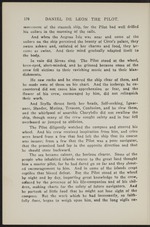 |
“...in fear fell
overboard or jumped to oblivion.
The Pilot diligently watched the compass and steered his
wheel. And his crew received inspiration from him, and cries
were heard from a few that had left the ship that its course
was insane; from a few that the Pilot was a poor navigator,
that the promised land lay in the opposite direction and that
he should steer backward.
The sea became calmer, the horizon clearer. Some of the
people who inhabited islands nearer to the great land thought
him a master pilot, for he had dared go so far and they shout-
ed encouragement to him. And in some of the islands crept
reptiles that hissed defeat. But the Pilot stood at the wheel
by night and by day, imparting great knowledge to the crew,
solaced by the presence of his life-companion and of his chil-
dren, making charts for the safety of future navigators. And
he partook of little food that he might not lose sight of the
compass. But the work which he had incessantly, so faith-
fully done, began to weigh...”
|
|
| 7 |
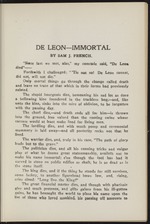 |
“...dies, and, truly in his case, The path of glory
leads but to the grave.
The politician dies, and all his cunning tricks and vulgar
play at what he deems great statesmanship, availeth not to
make his name immortal; een though the fool has had it
carved in stone on public edifice or shaft, he is as dead as is
the stone itself.
The king dies, and if the thing he stands for still survives,
some lackey, to another figurehead bows low, and, rising,
cries aloud: Long live the King!
The great financial master dies, and though with pharisaic
glee and much pretence, and gifts galore from his ill-gotten
gains, he has besought the world to place his name upon the
list of those who loved mankind, bis passing off amounts to...”
|
|
| 8 |
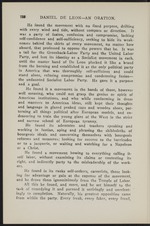 |
“...LEONAN ORATION.
He found the movement with no fixed purpose, drifting
with every wind and tide, without compass or direction. It
was a party of fuiion, confusion and compromise, lacking
self-confidence and self-sufficiency, seeking to hide its weak-
nesses behind the skirts of every movement, no matter how
absurd, that professed to oppose the powers that be. It was
a tail for the Greenback-Labor Party and the United Labor
Party, and lost its identity as a Socialist movement in each,
until the master hand of De Leon plucked it like a brand
from the burning and established it as the only political party
in America that was thoroughly self-sufficient and could
stand alone, refusing compromise and condemning fusion
the undaunted Socialist Labor Party. He gave it a purpose
and a goal.
He found it a movement in the hands of those, however
well meaning, who could not grasp the genius or spirit of
American institutions, and who while conforming in dress
and manners to American ideas, still kept...”
|
|
| 9 |
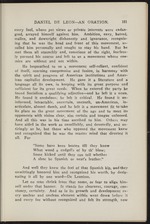 |
“...credulous: he left it critical. He found it un-
informed, intractable, uncertain, uncouth, un-American, in-
articulate, almost dumb, and he left it a movement fit to take
its place as the great movement of the age and to meet its
opponents with vision clear, aim certain and tongue unloosed.
And all this was in his time ascribed to him. Others may
have aided in the work as unselfishly, and devotedly, and un-
tiringly as he, but those who opposed the movement knew
and recognized that he was the master mind that directed it
all. For
Some have been beaten till they know
What wood a cudgels of by th blow;
Some kicked until they can tell whether
A shoe be Spanish or neats leather.
And well they knew the feel of that Spanish kip, and they
unwittingly honored him and recognized his worth, by desig-
nating it all by one wordDe Leonism.
Let no man shrink from that name, or fear to align him-
self under that banner. It stands for clearness, courage, con-
stancy, certainty. And as in its growth and...”
|
|
| 10 |
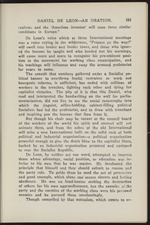 |
“...counsel will yet
animate them, and from the ashes of the old International
will arise a new International built on the solid rock of both
political and industrial organizationa political organization
powerful enough to give the death blow to the capitalist State,
backed by an industrial organization prepared and equipped
to rear the Socialist Republic.
De Leon, by neither act nor word, attempted to impress
those whose advantage, social position, or education was in-
ferior to his Own that he was master. He inculcated the
principle that himself and they should submit to reason and
the party rule. To guide them he used the art of persuasion
and good example, which alone can secure sincere and lasting
obedience. He was no head-hunter seeking the destruction
of others for his own aggrandizement, but the enemies of the
party and the enemies of the working class were his personal
enemies and he pursued them unrelentingly.
Though compelled by that ostracism, which comes to ev-...”
|
|
| 11 |
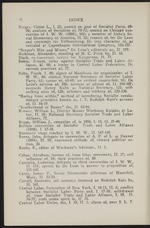 |
“...organization of 1.
W. W., 49; elected National Secretary of Socialist Labor
Party, 62; career of, 63-65; an evident counterfeit, 93; De
Leons opinion of, 106; account of advent of, II. 106-107;
succeeds Henry Kuhn as National Secretary, 121; self-
seeking aims of, 126; schemes and trickery of, 129-130.
Boring from within, method of introducing Socialist revolu-
tionary principles known as, I. 7; Rudolph Katzs account
of, II. 16-19.
"Brotherhood of Booze, the, II. 92-94.
Brower, William L., District Master Workman Knights of La-
bor, II. 29; National Secretary Socialist Trade and Labor
Alliance, 77.
Bryan, William J., campaign of, in 1896, I. 15, 11. 37-40.
Buffalo convention of Socialist Trade and Labor Alliance
(1898), I. 17-18.
Bummery stage reached by I. W. W., II. 147-148.
Burns, John, delegate to convention of A. F. of L. at Denver
(1894), II. 19; expressed attitude of, toward political ac-
tion, 20.
Bushe, F., editor of Workmens Advocate, II. 5.
Cahan, Abraham, income of, from labor movement...”
|
|
| 12 |
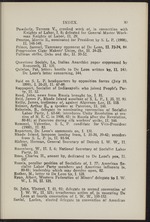 |
“...INDEX. XI
Powderly, Terence V., crooked work of, in connection with
Knights of Labor, I. 8; defeated for General Master Work-
man Knights of Labor, II. 29.
Preston, Morrie R., nominated for President by S. L. P. (1908),
II. 148-149.
Prince, Samuel, Tammany opponent of De Leon, II. 73-74, 84.
Progressive Cigar Makers Union, the, II. 24-25.
Pullman strike. Debs and the, II. 50-52.
Questione Sociale, La, Italian Anarchist paper suppressed by
Roosevelt, II. 131.
Quinlan, Pat, letters hostile to De Leon written by, II. 143;
De Leons letter concerning, 144.
Raid on S. L. P. headquarters by opposition forces (July 10,
1899), I. 20-21, II. 67-69.
Rappaport, Socialist of Indianapolis who joined Peoples Par-
ty, II. 12.
Reed, John, news from Russia brought by, I. 81.
Reid, James P., Rhode Island assailant of S. L. P., I. 35, II. 93.
Reilly, James, testimony of, against Algernon Lee, II. 118.
Reimer, Arthur E., a speaker at Paterson, II. 160.
Reinstein, B., delegate to nominating convention of Socialist...”
|
|
| 13 |
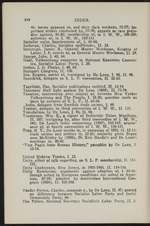 |
“...XIV
INDEX.
46; forces opposed to, and their dark methods, 75-77; im-
portant strikes conducted by, 77-78; appeals to race preju-
dice against, 81-82; membership of, in I. W. W., l(fe-109;
activities of, in I. W. W., 110-111.
Socialist unity, hopelessness of, I. 65-66,
Sotheran, Charles, Socialist spellbinder, II. IS.
Sovereign, James R., General Master Workman, Knights of
Labor, I. 8; course of, as General Master Workman, II. 29.
Spargo, John, I. 48, 64.
Stahl, Volkszeitung supporter in National Executive Commit-
tee, Socialist Labor Party, I. 20.
Stokes, J. G. Phelps, I. 48, 64.
Stuttgart Congress, II. 130.
Sue, Eugene, works of, translated by De Leon, I. 96, II. 98.
Suesskind, delegate to S. L. P. convention, II. 32-33.
Tageblatt, Das, Socialist publications entitled, II. 13-14.
Tammany Hall fight against De Leon (1899), II. 73-74.
Taxation, controversy over subject of, between New Yorker
Volkszeitung and The People, I. 18-20; question made an
issue by enemies of S. L. P., II. 63-64....”
|
|
